Emergency HVAC Finchley
Find the best 24/7 HVAC Repair in Finchley
Get multiple Emergency HVAC Service quotes for your project today! Compare profiles, reviews, accreditations, portfolio, etc... and choose the best service.

Shears Plumbing Heating & Gas Tamworth
550 reviewsOrchard House, Portleys Lane, Drayton Bassett, Tamworth, B78 2AA, GBShears Plumbing, Heating & Gas is a reliable and experienced plumbing company based in Tamworth. With over 50 years of combined experience in the plumbing trade, our team of expert plumbers and gas fitters pride themselves on a high standard of work and friendly service. We offer a range of services, including boiler services, bathroom installation, and kitchen installation, and are Gas Safe registered, fully insured, and Worcester Accredited Experts. We are committed to providing excellent customer satisfaction, quality workmanship, and excellent service.
- Services
- Why Us?
- Accreditations
- Our Team
- Gallery
Get Quote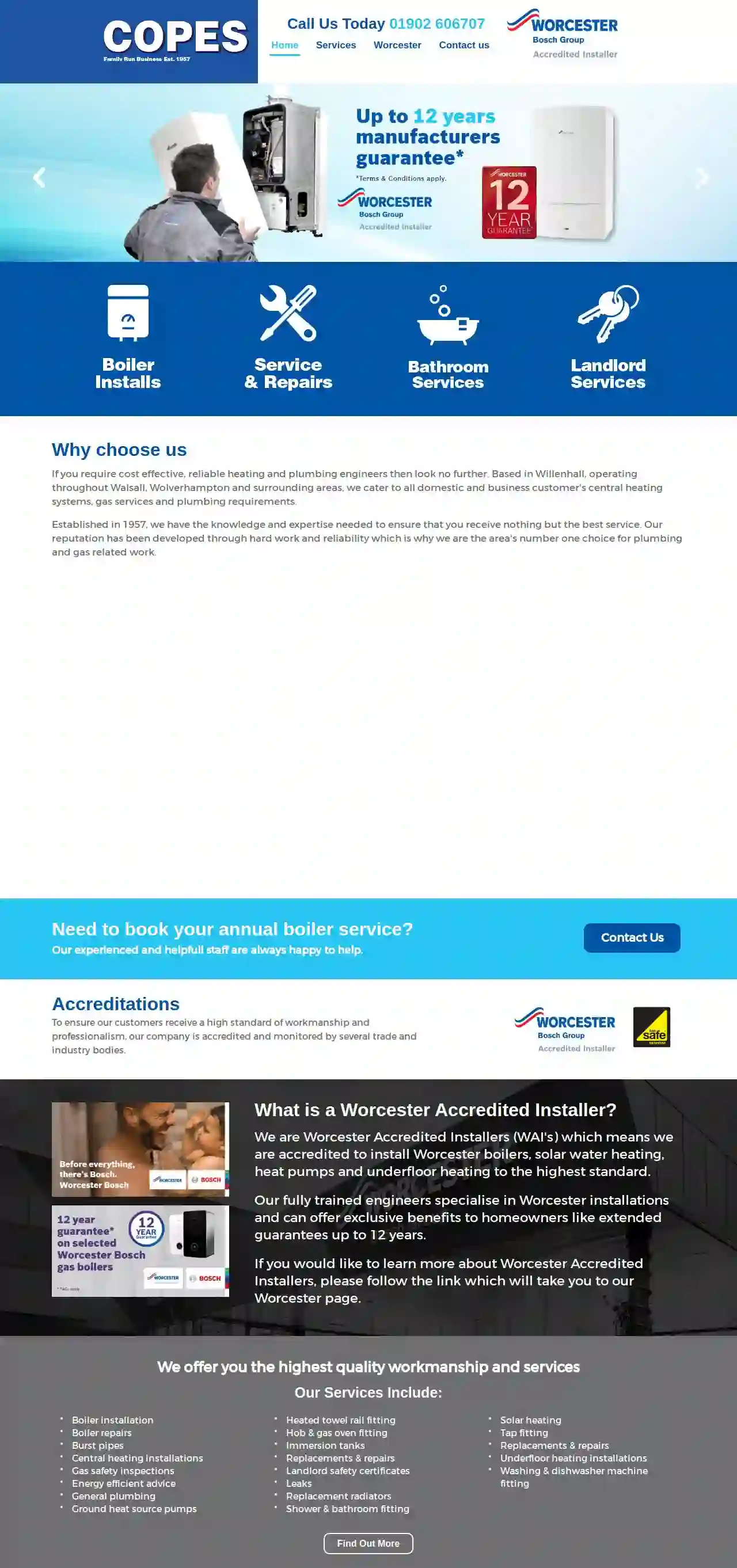
Copes Heating
4.411 reviews16 John Riley Drive, Willenhall, WV12 5AS, GBEstablished in 1957, Copes Heating is a reliable and cost-effective heating and plumbing engineer based in Willenhall, operating throughout Walsall, Wolverhampton, and surrounding areas. We cater to all domestic and business customers' central heating systems, gas services, and plumbing requirements. Our reputation has been developed through hard work and reliability, making us the area's number one choice for plumbing and gas-related work. We are accredited and monitored by several trade and industry bodies, ensuring our customers receive a high standard of workmanship and professionalism. Our experienced and helpful staff are always happy to assist with any queries or bookings.
- Services
- Why Us?
- Accreditations
- Gallery
Get Quote
Simply Air Conditioning London
3.816 reviews295 High Road, Chiswick, 295 High Road Chiswick, W4 4HH, GBSimply Air Conditioning London offer a 24 hour call out service. We are a team of experienced engineers who are dedicated to providing our customers with the highest quality air conditioning services. We offer a wide range of services, including installation, maintenance, and supply of air conditioning units. We also offer a free trial of our air deflectors. Our team is fully qualified and insured, and we are committed to providing our customers with a safe and reliable service. We are also members of the F-Gas Register . We are proud to be a local business, and we are committed to serving the London community. We offer competitive prices and a friendly, professional service. If you are looking for a reliable and experienced air conditioning company in London, look no further than Simply Air Conditioning London.
- Services
- Why Us?
- Accreditations
- Testimonials
- Gallery
Get Quote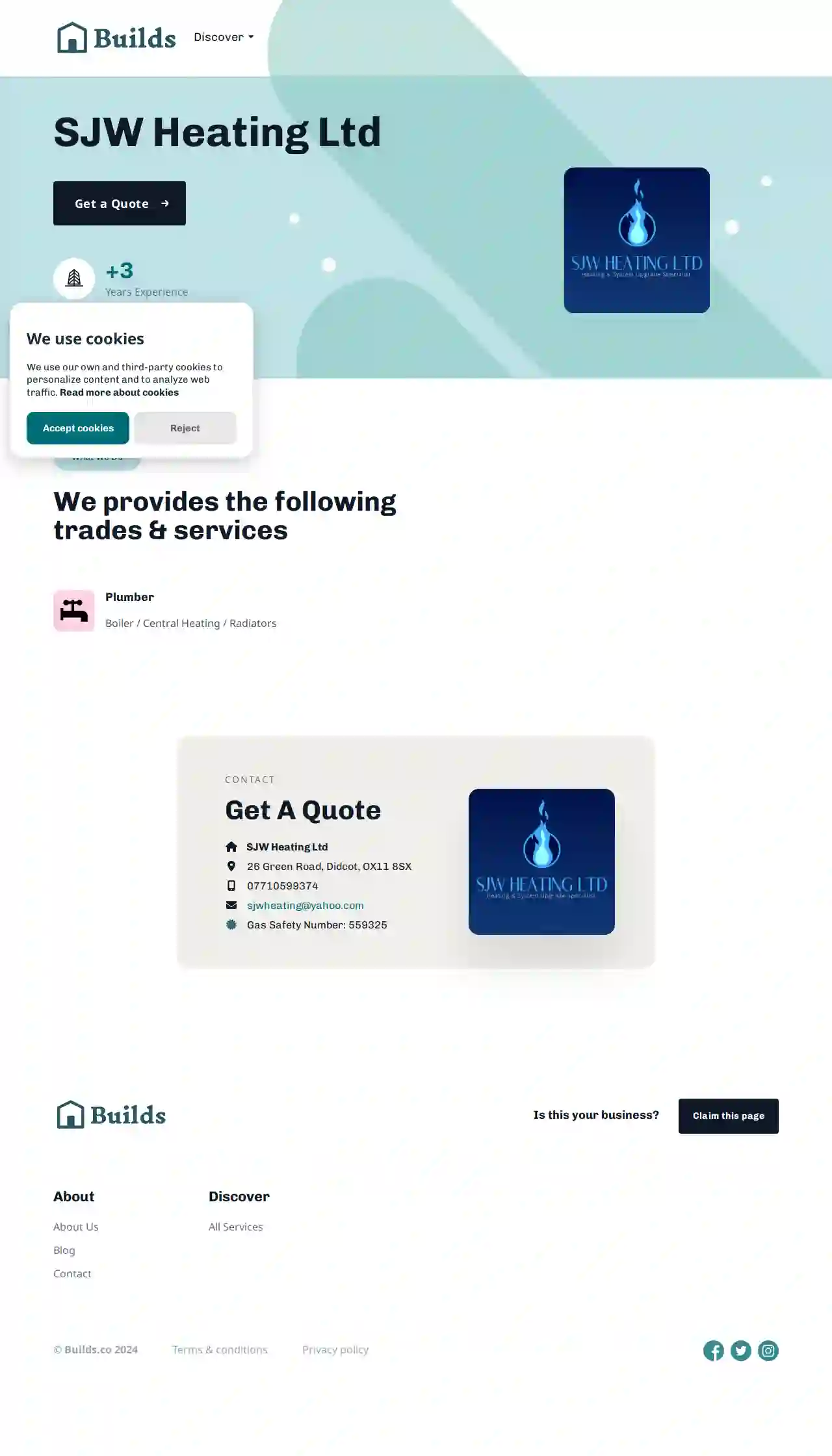
SJW Heating Ltd
126 Green Road, Didcot, OX11 8SX, GBAt Builds.co, we are a reliable online job market for local and highly-skilled construction tradesmen. We connect homeowners in need to the skilled tradesperson who's capable of doing the job in the most stress-free way possible. Our mission is to make it almost instant for homeowners to find the right expert and access a pool of highly-skilled tradespeople who specialise in their specific need. For skilled tradespeople, we aim to become the leading tradesman job market who will be your springboard to starting and building your own tradesmen business. We provide a peace of mind solution for homeowners, knowing their home is in good hands with our trusted tradespeople.
- Services
- Why Us?
- Gallery
Get Quote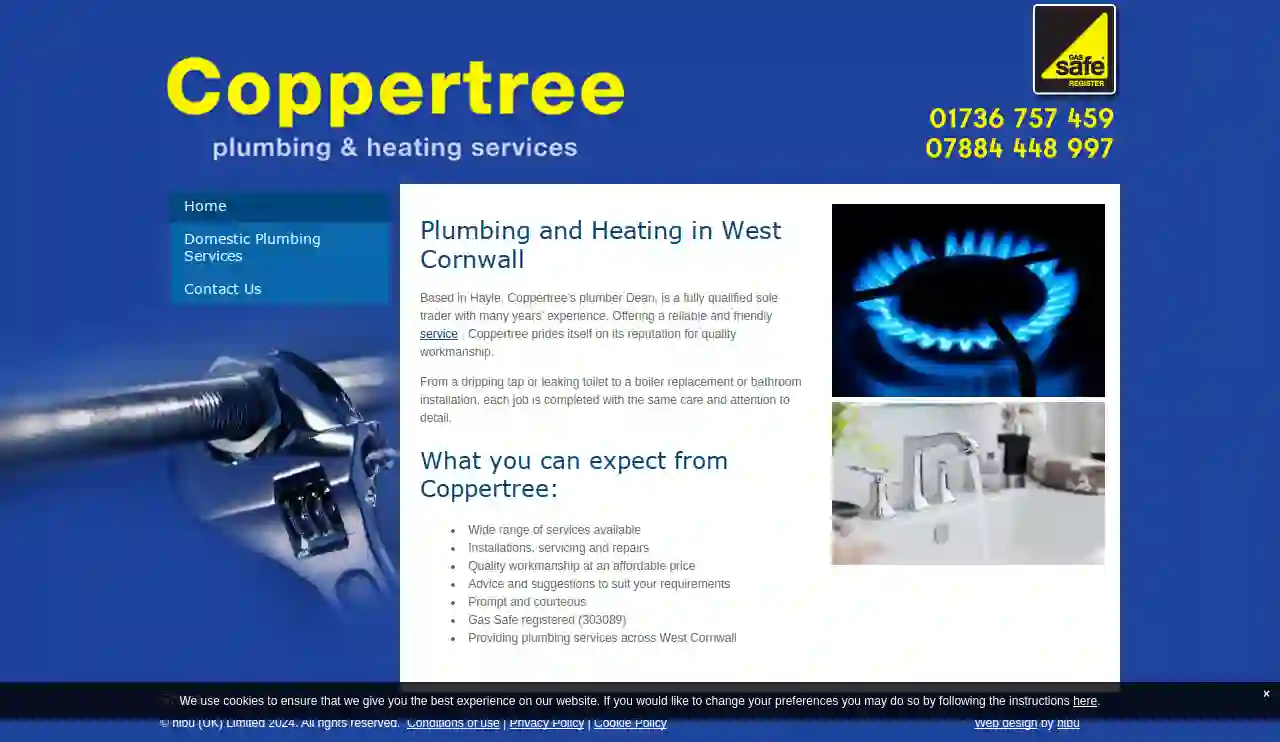
Coppertree Plumbing & Heating Services
52 reviews5 Trelawney Place, Hayle, TR27 4LF, GBCoppertree Plumbing & Heating is a fully qualified sole trader with many years' experience, based in Hayle, West Cornwall. We pride ourselves on our reputation for quality workmanship, offering a reliable and friendly service. From a dripping tap or leaking toilet to a boiler replacement or bathroom installation, each job is completed with the same care and attention to detail. We provide a wide range of services, including installations, servicing, and repairs, with quality workmanship at an affordable price. Our team is Gas Safe registered (303089) and provides plumbing services across West Cornwall.
- Services
- Why Us?
- Our Team
- Gallery
Get Quote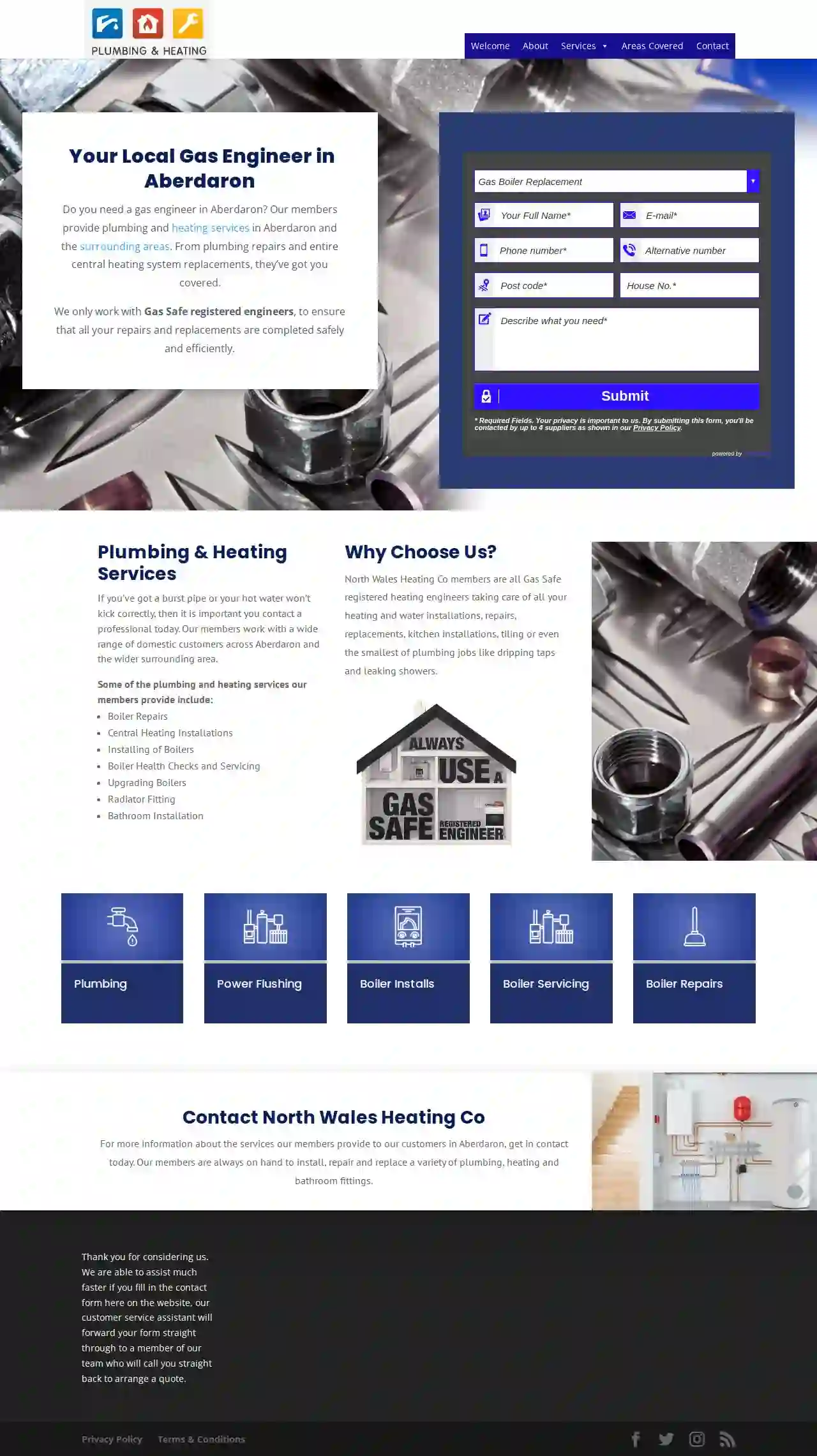
Owen w R
1Bangor, GBNorth Wales Heating Co provides plumbing and heating services in North Wales and the surrounding areas. Our members are Gas Safe registered engineers, ensuring all repairs and replacements are completed safely and efficiently. We offer a range of services, including boiler repairs, central heating installations, boiler health checks and servicing, upgrading boilers, radiator fitting, and bathroom installation. Our team is dedicated to providing excellent customer service and ensuring that all our customers receive the highest level of workmanship and professionalism.
- Services
- Why Us?
- Gallery
Get Quote
CN Plumbing & Heating Ltd
4.532 reviews2A, Clopton Park, Park Road, Clopton, Woodbridge, GBEstablished in 2012 by Christopher Canham and Nigel Miller, CN Plumbing & Heating offers a comprehensive plumbing service within Suffolk, Norfolk, and Essex. Our experienced team are able to assist with both domestic and commercial plumbing work including gas, LPG and oil. Our Covid awareness will ensure that our team have regular lateral flow tests and when working in domestic environments that we have the correct PPE and social distance guidelines in place to protect you and us. We are aware that we may work in some vulnerable households, and we need to do our bit to ensure you are warm, safe, and secure.
- Services
- Why Us?
- Accreditations
- Our Team
- Testimonials
- Gallery
Get Quote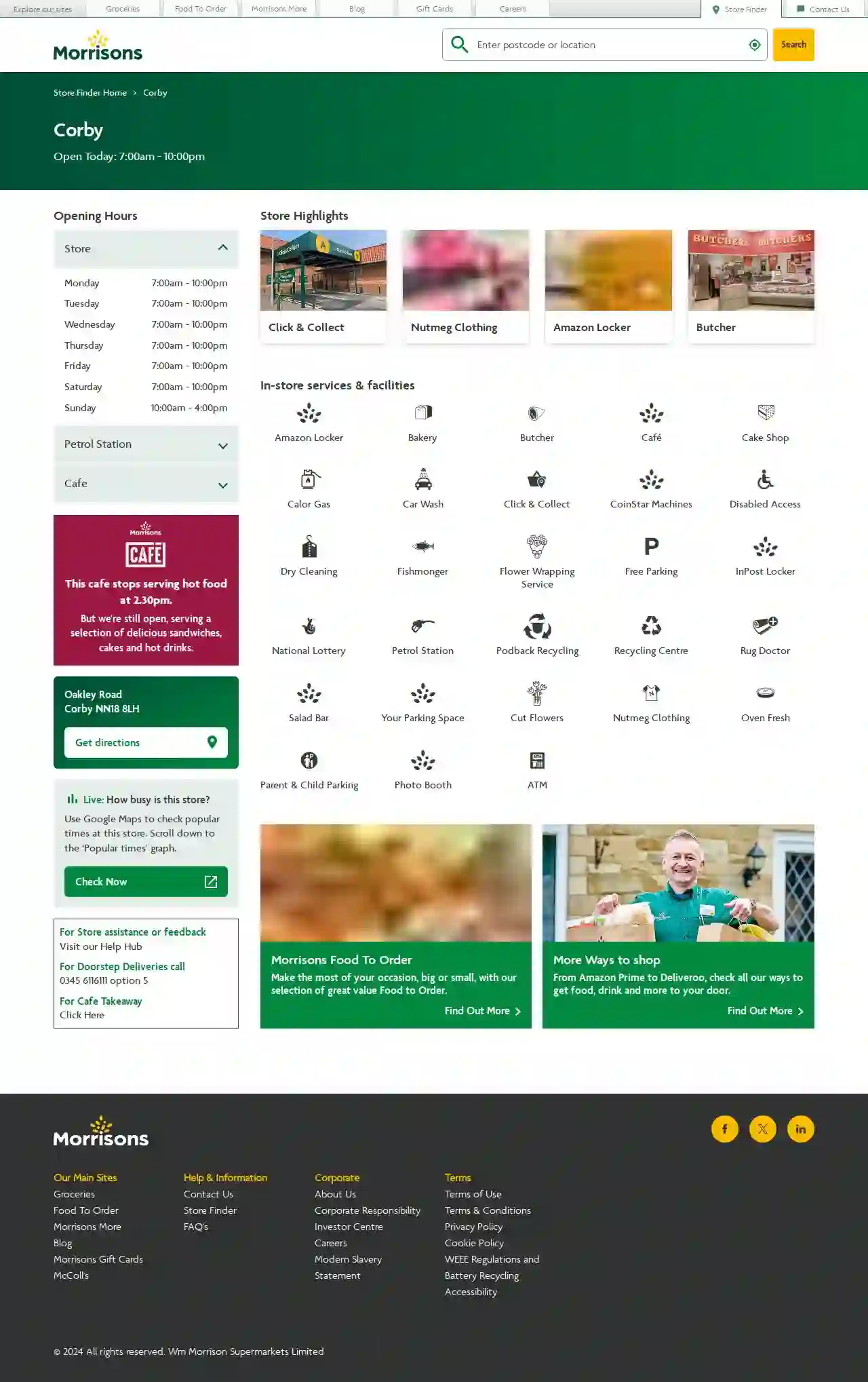
Morrisons
4Oakley Road, Corby, NN18 8LH, GBMorrisons Cafe is a place to relax and enjoy a bite to eat after your shopping trip. We offer a wide variety of delicious food and drinks, from classic favourites to new and exciting dishes. Our menu includes everything from breakfast to dinner, so there's something for everyone. We also have a great selection of cakes and pastries, perfect for a sweet treat. Our cafe is open every day, so come on down and see what we have to offer.
- Services
- Why Us?
- Gallery
Get Quote
Fast Heat
4.826 reviews7 St Thomas's Rd, Luton, LU2 7UX, GBFast Heat is an independent Gas Safe registered plumbing and heating business serving clients throughout Luton, Dunstable, Harpenden and the surrounding areas. We offer a range of gas works including central heating installations, boiler maintenance and repairs. It is vital that you get your boiler and gas appliances serviced regularly to make sure they are working as safely and efficiently as possible. Our Gas Safe registered Engineer will assess your appliance and provide safety advice to ensure you remain compliant with current legislation. We also provide a one-off deep clean service called Heating System Power Flushing, which makes sure your radiators heat up consistently and removes any cold spots. We install, service and maintain Air to Water Renewable Heat Pumps, a significantly more energy efficient heating system. We also install and maintain Unvented Hot Water Cylinders (Megaflow), a pressurised system fed directly from the cold mains water feed, great for bathrooms. Fast Heat also offers LPG installation and maintenance of propane and butane gas pipe work and appliances. We can install Smart Home Heating Controls, an internet connected thermostat and timer you can use to control your heating from anywhere with your smartphone. Whatever heating or plumbing services our clients need, we are on hand to dispatch our fully trained engineers to assist you. No job too big or small. At Fast Heat we specialize in replacing your old boilers with our brand new state of the art Worcester Bosch boilers. All Worcester Bosch boilers come with a 10 year guarantee which gives you peace of mind and the assurance of a quality boiler to last you years. Fast Heat is a Gas Safe registered company, Gas Safe Registered, LPG Certified and offers 24/7 Emergency Callout.
- Services
- Why Us?
- Accreditations
- Our Team
- Testimonials
- Gallery
Get Quote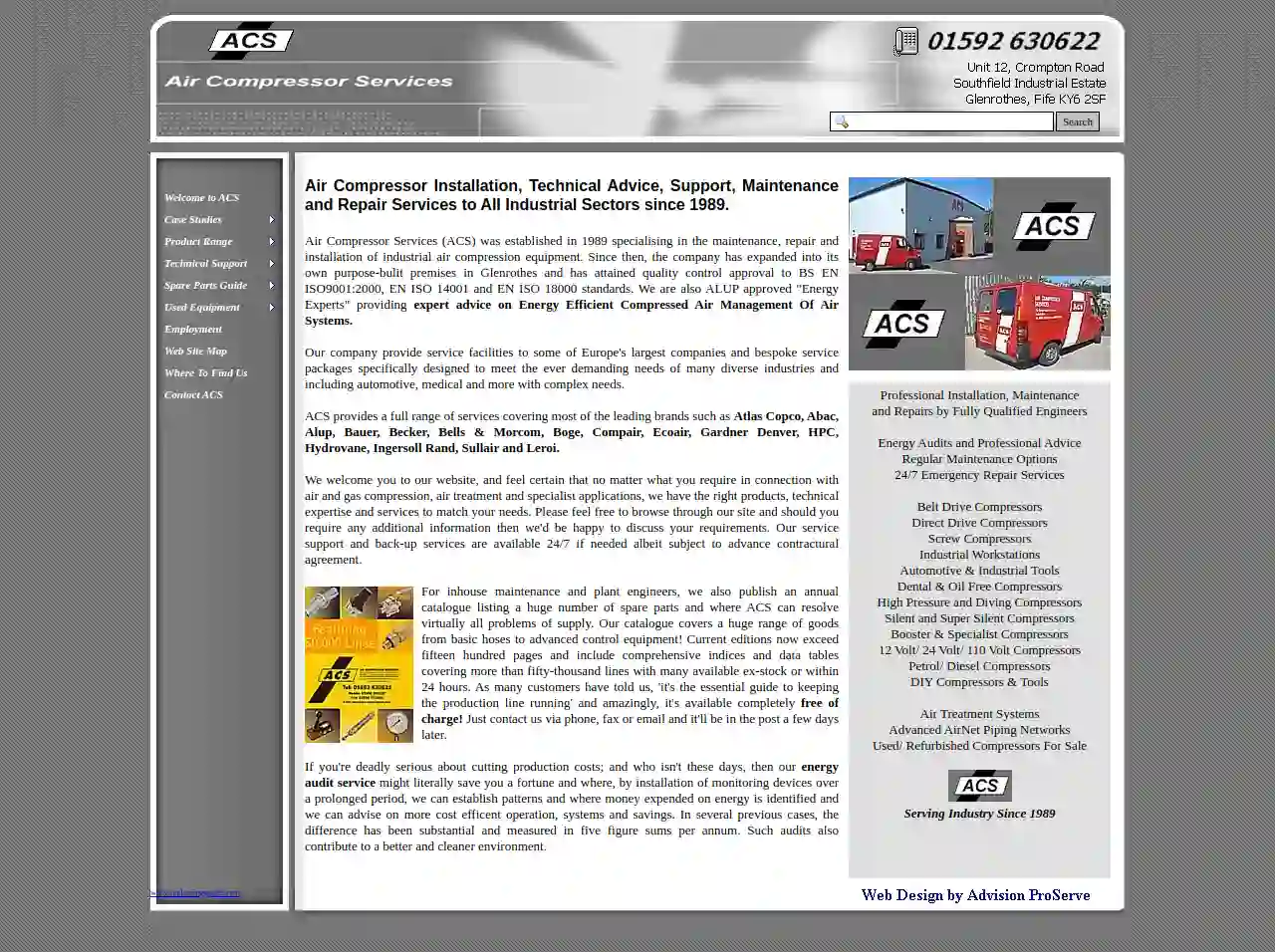
Air Compressor Services
58 reviewsGlenrothes, Fife, Unit 1, Glenrothes Business Park, KY7 3XJ, GBAir Compressor Services (ACS) was established in 1989 specialising in the maintenance, repair and installation of industrial air compression equipment. Since then, the company has expanded into its own purpose-built premises in Glenrothes and has attained quality control approval to BS EN ISO9001:2000, EN ISO 14001 and EN ISO 18000 standards. We are also ALUP approved "Energy Experts" providing expert advice on Energy Efficient Compressed Air Management Of Air Systems. Our company provides service facilities to some of Europe's largest companies and bespoke service packages specifically designed to meet the ever-demanding needs of many diverse industries and including automotive, medical and more with complex needs. ACS provides a full range of services covering most of the leading brands such as Atlas Copco, Abac, Alup, Bauer, Becker, Bells & Morcom, Boge, Compair, Ecoair, Gardner Denver, HPC, Hydrovane, Ingersoll Rand, Sullair and Leroi. We welcome you to our website, and feel certain that no matter what you require in connection with air and gas compression, air treatment and specialist applications, we have the right products, technical expertise and services to match your needs. Please feel free to browse through our site and should you require any additional information then we'd be happy to discuss your requirements. Our service support and back-up services are available 24/7 if needed albeit subject to advance contractual agreement.
- Services
- Why Us?
- Accreditations
- Gallery
Get Quote
Over 16,895+ HVAC Contractors onboarded
Our HVAC companies operate in Finchley and beyond!
HVACCompaniesHub has curated and vetted Top HVAC Businesses in Finchley. Find a top & reliable pro today.
Frequently Asked Questions About Emergency HVAC Services
- Change or clean air filters every 1-3 months.
- Clear debris from around the outdoor unit.
- Check and clean the evaporator coil (if accessible).
- Inspect refrigerant lines for leaks.
How long does it take for an emergency HVAC technician to arrive?
What is a dehumidifier, and do I need one?
What is carbon monoxide, and how can it affect my HVAC system?
How do I maintain my air conditioner?
How long does it take for an emergency HVAC technician to arrive?
What is a dehumidifier, and do I need one?
What is carbon monoxide, and how can it affect my HVAC system?
How do I maintain my air conditioner?
- Change or clean air filters every 1-3 months.
- Clear debris from around the outdoor unit.
- Check and clean the evaporator coil (if accessible).
- Inspect refrigerant lines for leaks.